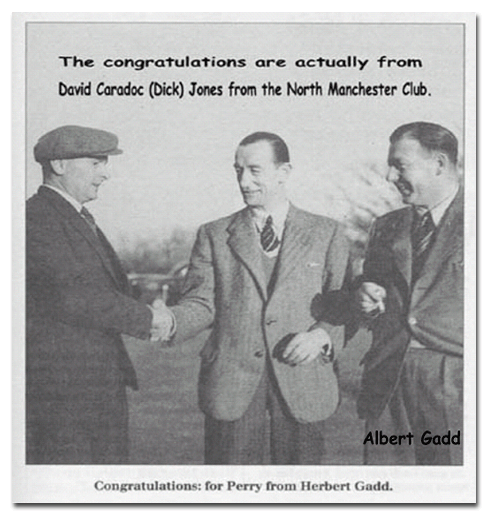|
| |
 In sixth place at Muirfield was the American Ryder Cup player, Henry Picard, one of the finest swingers in the game. (He was the man who, a couple of years later, helped two young American pros. He offered financial support to one who was struggling to make a living at that time – his name was Ben Hogan - and he also gave a boost to the career of Sam Snead by giving him a driver which instantly solved Snead’s hooking problem). When Picard joined the group on the Drem platform he commented: “If the Perry playing at Wimbledon is as good as the Perry who won today then our American tennis players may as well come home with me”. The more famous Perry, Fred (no relation), beat the German Baron Gottfried Von Cramm to retain the Wimbledon title he had won the previous year. That first victory had been a week too late to win a long-standing bet with Henry Cotton. They had a £10 wager on who would be first to win their respective championships, but Fred’s first victory at Wimbledon was a week after Henry’s at Sandwich. Perry went on to complete his hat trick in 1936, Britain’s last success in the men’s singles. I don’t know if Fred had a bet with Alf, but anyone who had a ‘Perry double’ that year would have got very good odds. Cotton had closed with a 75 for 293 and finished seventh, with Syd Easterbrook. It was a good year for the British, who took the first three places, with Little and Picard being the only two Americans in the top ten. In 1935 the Ryder Cup match was in the USA and most of them had stayed at home, including Sarazen. That year Gene became the first winner of the modern Grand Slam when he won the Masters, which Bobby Jones had inaugurated the previous year. He holed a 230-yard 4-wood shot for an albatross, or double-eagle as the American’s called it. It was one of the most famous shots in golf history. In that Muirfield Open a notable name lower down the list was 22-years-old Dai Rees, who had been assistant to my brother George at Malden before moving to Surbiton. He was to go on to finish in the top thirty in every championship until 1961. The mercurial little Welshman with the baseball grip had won the British Assistants’ Championship that year and the following year was to win the News of the World Matchplay Championship. I was to see a fair bit of him in the next few years. Behind Lawson Little were seven British amateurs who played on the last day - the thirties are regarded as the golden age of British amateur golf. P. B. (Laddie) Lucas finished tied for twenty-third place |
